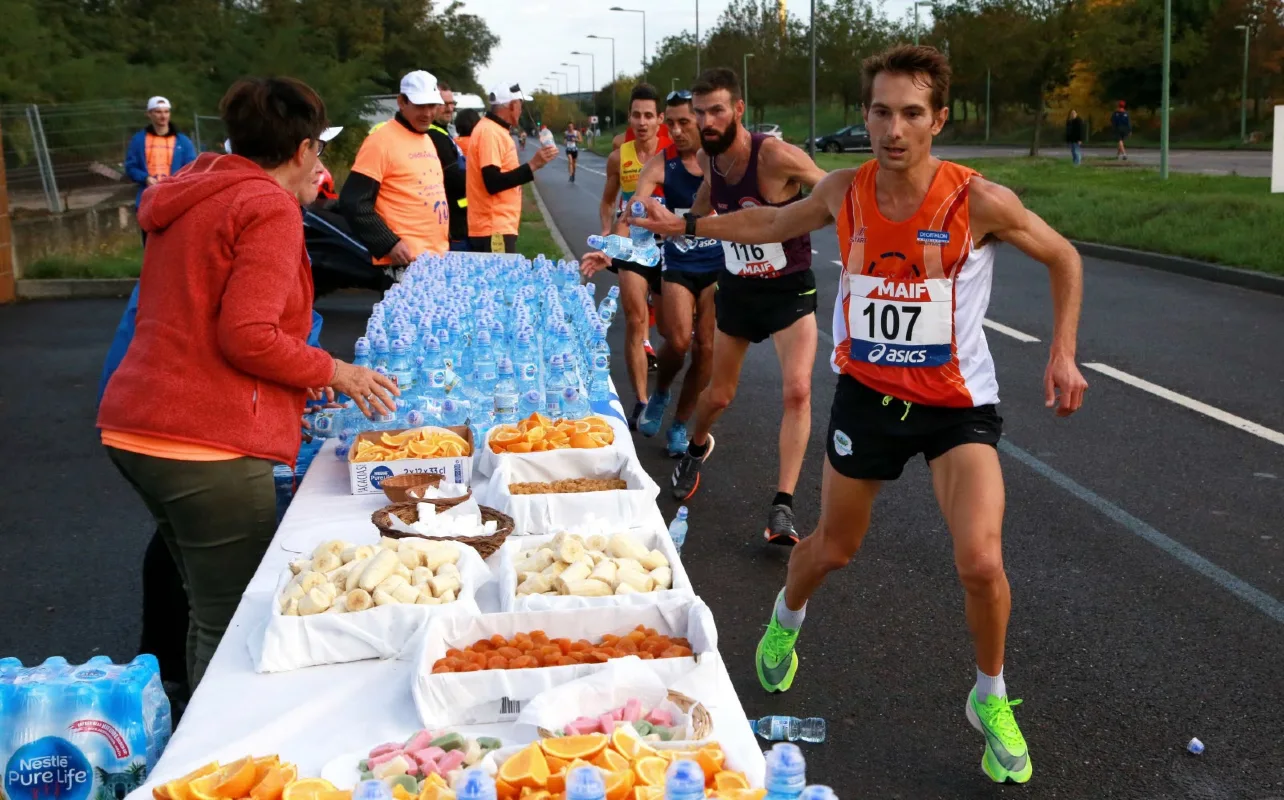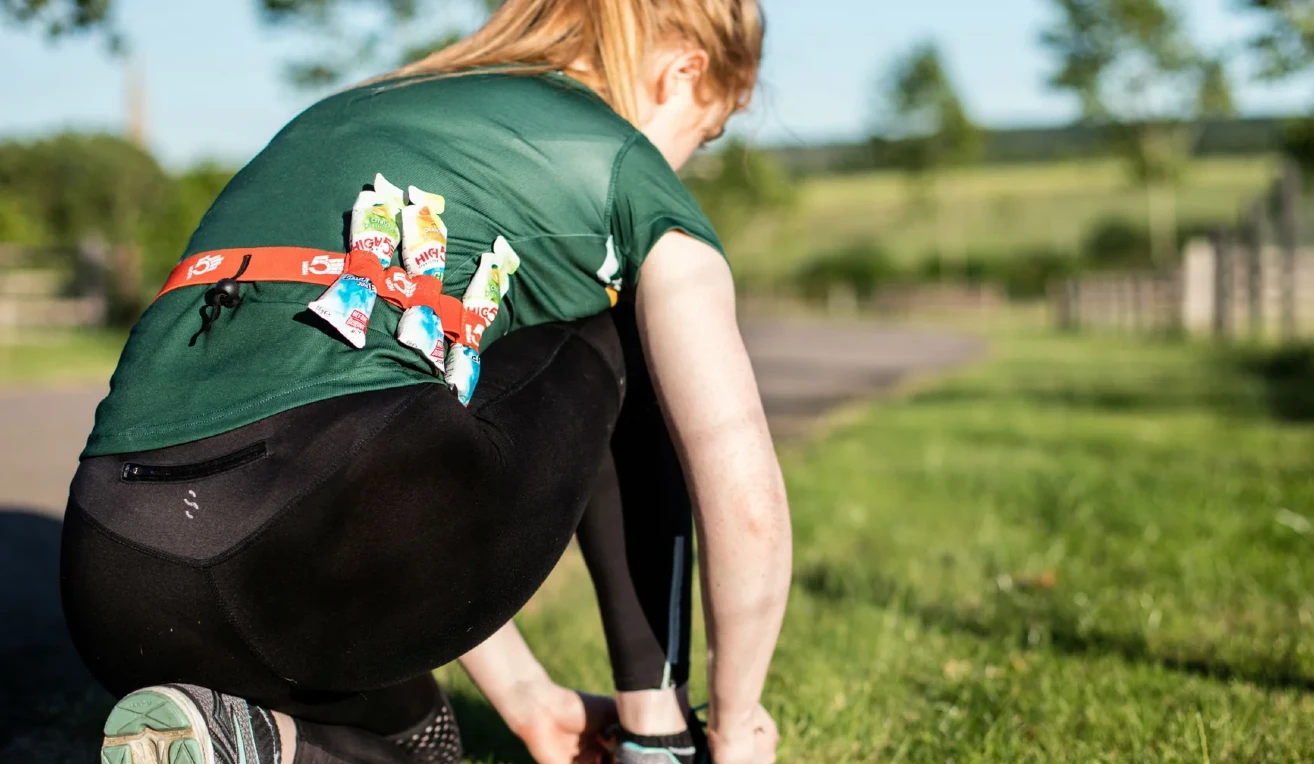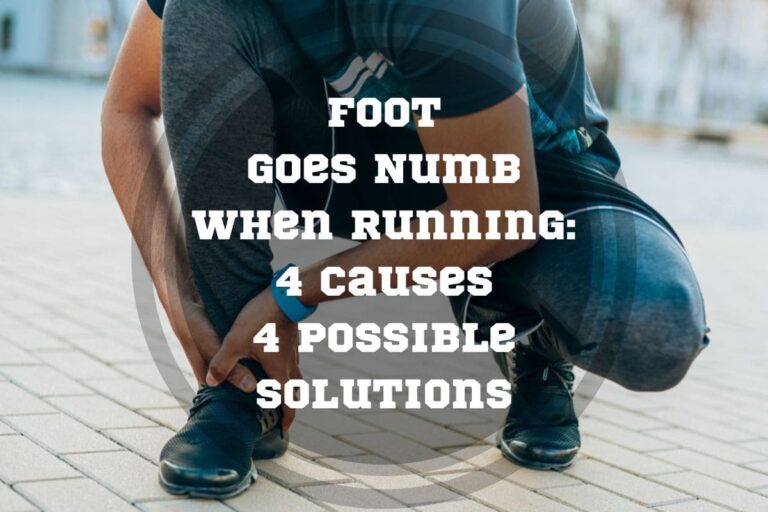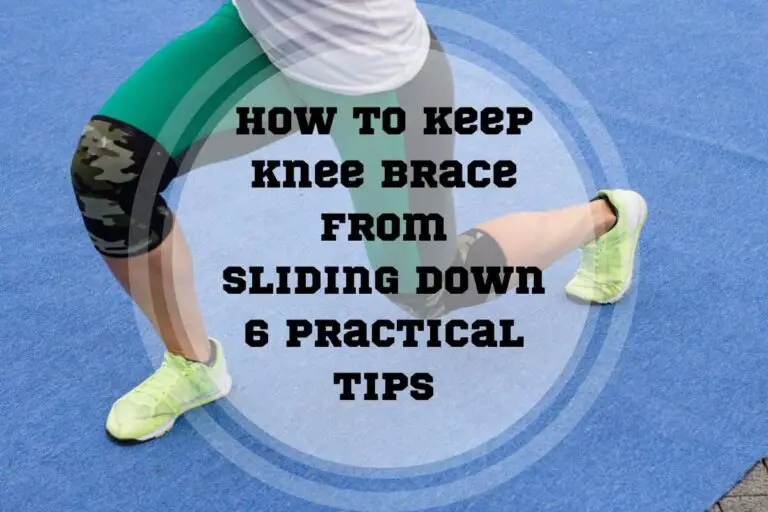Fuel During a Half Marathon: Fueling Strategies To Boost Your Performance
Reviewed by: Olexandr Maximenko (Sports Nutritionist, MSc)
If you are planning to run a half marathon, it’s essential to consider your nutrition strategy. Do I need to fuel during a half marathon? Fueling your body during a race is crucial to maintain your energy levels and avoid hitting the infamous ‘wall.’
This article will discuss the detailed nutrition strategy for long-distance runners. What diet should you follow? What to eat and drink during workouts and the race? When to fuel during a half marathon? Let’s discover all the details about half marathon fueling together!
The fueling for the half marathon includes a healthy endurance diet, pre- and post-workout food, and race day nutrition. You must balance proteins, fats, and carbs to stay in good running shape. You also need to maintain sufficient half marathon hydration.
Do I Need to Eat During a Half Marathon?
It is highly recommended that you consume food during a half marathon. The human body can only store a limited amount of glycogen, the primary fuel source for muscles during exercise. Running a half marathon without replenishing your glycogen stores can lead to a drop in blood sugar levels, which can cause fatigue, dizziness, and nausea.
During a half marathon, it is recommended that runners consume between 30-60 grams of carbs per hour, depending on their body weight and the intensity of the race. It can come from energy gels, sports drinks, or other easily digestible foods.
It is vital to practice consuming food during training to determine what works best for your body. Some runners may experience gastrointestinal distress when consuming certain types of food, so it’s essential to find what works for you before race day.

Do You Need a Diet Before the Race?
When it comes to half marathon races, proper half marathon diets are essential for your performance. Your body requires sufficient fuel to endure the distance and intensity of the race, so it is crucial to maintain a healthy and balanced half marathon fueling before the race.
A few weeks before the race, start eating a balanced diet that includes carbs, protein, healthy fats, and plenty of fruits and vegetables. Carbohydrates are a crucial energy source, so try to consume complex carbs such as whole grains, fruits, and vegetables. Protein is also essential for muscle recovery and repair, so include lean protein sources such as chicken, fish, or dairy.
It is important to note that not all carbohydrates are the same. For instance, simple carbs, like sugar, provide a quick burst of energy but are short-lasting. On the other hand, complex carbohydrates, like whole grains, provide a more sustainable energy source, which is what your body needs for a half marathon race.
Protein is essential for repairing and rebuilding muscle tissues after a workout. Lean protein sources are perfect because they are less likely to cause digestive issues.
Avoid consuming high-fat, high-sugar, and processed foods, as they can cause digestive issues and make you feel sluggish. Also, avoid trying new foods or supplements before the race, as they can cause stomach discomfort or unexpected reactions.
Ensure your body has sufficient fuel to perform at its best. Plan, so you can have enough time to adjust to the new diet and stick to what works best for you.
If you have any questions or concerns about your half marathon fueling before the race, consulting with a licensed dietitian or your healthcare provider is always a good idea. They can provide personalized nutrition advice and help you develop a diet plan that suits your needs.
Fat and Carbohydrate Burning at Different Training Intensities
When it comes to burning calories during a run, the body uses two primary sources of fuel: carbs and fat. The ratio of these two fuels used during exercise depends on the intensity of the workout.
At low intensities, the body primarily burns fat for energy. This is because fat is a slow-burning fuel that can provide sustained energy for extended periods. As the intensity of the workout increases, the body starts to rely more on carbohydrates for energy. This is because carbohydrates are a fast-burning fuel that can provide quick bursts of energy for high-intensity exercise.
Research shows that the intensity at which the body switches from primarily burning fat to primarily burning carbohydrates is known as the “crossover point.” This point varies from person to person and can be influenced by factors such as fitness level, diet, and genetics.
It’s important to note that even at high intensities, the body still burns a significant amount of fat for fuel. However, the percentage of energy derived from fat decreases as the intensity of the exercise grows.
To optimize fat burning, it is recommended that individuals perform low-intensity exercises, such as walking or jogging, for longer periods. This will allow the body to utilize fat stores for energy, resulting in more fat-burning during the workout.
On the other hand, if your goal is to improve performance and endurance, high-intensity exercises, such as sprints or interval training, may be more effective. Understanding the relationship between fat and carbohydrate burning during exercise can help runners diversify their workouts and nutrition to achieve their fitness goals.
Subscribe to Our Running Newsletter!
Get free running tips from renowned professional athletes and discounts from top-notch brands.
For athletes, it is crucial to stay hydrated during a half marathon to maintain peak performance. The human body is made up of 60% water, and even a small amount of dehydration can negatively impact your performance. Drinking water can help you achieve adequate hydration levels for optimal performance. But what about other drinks?

1. Sports Drinks
Sports drinks are an excellent option for fueling for a half marathon as they contain electrolytes, which help to replenish the minerals lost through sweating. Electrolytes are essential for proper muscle and nerve function. Sodium, potassium, and magnesium are examples of electrolytes lost through sweat. Drinking electrolyte drinks can help keep your body hydrated and balanced, which is essential for optimal performance.
It is important to note that not all electrolyte drinks are created equal. Some contain high amounts of sugar, which can lead to a crash later on. Look for drinks that balance electrolytes and carbs for sustained energy. Drinking pure water is also essential for proper half marathon hydration, especially when combined with sports and electrolyte drinks.
2. Caffeine
Caffeine has been shown to boost athletic performance by increasing endurance and reducing fatigue. However, caffeine intake should be limited before and during a half marathon. Consuming caffeine can lead to dehydration and cause an upset stomach, which can negatively impact your running performance. Caffeine can be found in many sports drinks, energy gels, and even some foods, so it’s important to read labels and be aware of how much caffeine you consume.
Nutritional Strategy for the Half Marathon
How to fuel during a half marathon? What to eat during a half marathon? When preparing for a half marathon, it is important to have a solid nutrition strategy. Proper nutrition can help fuel your body for training and race day, improve performance, and aid in recovery. Here are some tips to help you create a half-marathon nutrition plan.
1. Pre-Training Nutrition
Before you even start training for your half marathon, fueling your body with nutrient-dense foods is important. Focus on eating a balanced diet with plenty of whole foods such as whole grains, fruits, lean protein sources, vegetables, and healthy fats. Avoid processed sugary drinks, foods, and alcohol.
It’s important to note that everyone’s nutritional needs vary based on their individual goals, training plan, and lifestyle. Consider consulting a registered dietitian to help you create a personalized nutrition plan that works best for you.
2. During Training Nutrition
When you start training for your half marathon, fueling your body with the proper nutrients at the right time is essential. Here are some tips for nutrition during training:
- Hydrate: Drink plenty of water before, during, and after your runs to stay hydrated. Aim for at least 64 ounces of water daily and more on hot or humid days.
- Carbohydrates: Carbs are your body’s main source of energy during exercise. Ensure you include plenty of complex carbohydrates in your diet, such as whole grains, fruits, and vegetables. Aim for 3-5 grams of carbs per pound of body weight per day, depending on the intensity and duration of your training.
- Protein: Protein is important for muscle repair and recovery. Include lean protein sources such as chicken, fish, and legumes. Aim for 0.5-0.7 grams of protein per pound of body weight per day.
- Electrolytes: Electrolytes such as sodium, potassium, and magnesium are important for proper muscle function. Consider adding an electrolyte drink to your training routine, especially if you are training in hot or humid conditions.
3. Race Day Nutrition
When to fuel during a half marathon? It is important to stick to your usual nutrition routine on race day. Avoid trying new foods or supplements that your body is not used to. Here are some tips for race day nutrition:
- Pre-Race Meal: Eat a balanced meal that includes complex carbohydrates, protein, and healthy fats 2-3 hours before the start of the race. This will give your body enough time to digest the food and give you the energy you need to perform your best.
- Hydrate: Drink water or an electrolyte drink before the race to ensure you are hydrated. Aim for 16-20 ounces of water or sports drink 2-3 hours before the start of the race.
- Fuel During the Race: Fuel your body with carbohydrates and electrolytes. Aim for 30-60 grams of carbohydrates per hour of exercise, depending on the intensity and duration of your race. Consider using sports drinks or gels as the best fuel during half marathon to maintain your energy levels.
- Recovery: After the race, refuel your body with a balanced meal that includes carbs and protein to aid recovery. Aim for a 3:1 or 4:1 ratio of carbs to protein within 30 minutes of finishing the race.
By following these tips, you can create a solid half-marathon nutrition plan that will help fuel your body for training and race day. Remember to listen to your body and adjust your nutrition plan to meet your needs.
Frequently Asked Questions About Nutritional Strategy For The Half Marathon
Should You Fuel for a Half Marathon?
You must fuel your body right to perform well in your half marathon. Fueling before and during the race can help you avoid hitting the wall. Make sure to eat a high-carb meal at least 3 hours before the start and consume carbs during the race to keep your energy levels up.
How Do You Fuel Yourself for a Half Marathon?
Fueling your body is crucial for running a successful half marathon. Hydrate well, eat a high-carb meal before the race, and don’t skip breakfast, but give it time to digest well. Refuel during the race – get some energy gels, sports drinks, or other carb snacks to give you energy.
Final Thoughts on Nutrition and Fueling During a Half Marathon
A half marathon is a challenging race that requires a lot of energy and effort from the runner. For this reason, it is crucial to have a solid fueling plan to maintain energy levels and prevent fatigue during the race.
Carbohydrates are the primary fuel source for endurance exercise, and consuming them before and during the race can help you maintain your energy levels. Consume carbs in the form of easily digestible foods such as sports drinks, gels, bananas, or energy bars. It’s important to drink enough water and electrolyte drinks to keep half marathon hydration, which can help you to avoid fatigue and muscle cramps.
Finding the perfect fueling plan for your body is a process that requires practice and experimentation. During your training runs, try different fueling strategies and determine what works best for you. Practice consuming different carbohydrates and fluids to see what your body can tolerate and what gives you the most energy.
Do you have any questions about your running nutrition strategy? Feel free to ask them in the comments below.
Also read:
- How to Run a Faster Mile
- Sub 2 Hour Half Marathon
- Sub 4 Hour Marathon
- Is a 9 Minute Mile Good
- Is Running in Place Effective
- Running Twice a Day
- Running 5 Miles a Day
- Does Running Make You Taller
- Best Running Insole
References:
- Glycogen: The Best Fuel for Your Muscles // StrengthLog: https://www.strengthlog.com/glycogen/
- Dietary restrictions in endurance runners to mitigate exercise-induced gastrointestinal symptoms // PMC: https://www.ncbi.nlm.nih.gov/pmc/articles/PMC7288429/
- Contemporary Nutrition Strategies to Optimize Performance in Distance Runners and Race Walkers // PubMed: https://pubmed.ncbi.nlm.nih.gov/30747558/
- Effect of carbohydrate intake on half-marathon performance of well-trained runners // PubMed: https://pubmed.ncbi.nlm.nih.gov/16521844/
- Supplement intake in half-marathon, (ultra-)marathon and 10-km runners – results from the NURMI study (Step 2) // PubMed: https://pubmed.ncbi.nlm.nih.gov/34579746/
- Dietary Intake of Recreational Endurance Runners Associated with Race Distance—Results from the NURMI Study (Step 2) // PMC: https://www.ncbi.nlm.nih.gov/pmc/articles/PMC9503531/
If you have any questions or suggestions, you can contact us via email – [email protected]





